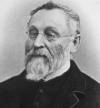DR. VON BOENNINGHAUSEN.

BY AD. LIPPE, M. D., PHILADELPHIA, PA.
The sad news has reached as that again one of the veterans of Homoeopathy has left. On the 26th day of February, the good and noble BARON CLEMENS MARIA FRANZ VON BOENNINGHAUSEN, died at Munster, at the age of 79 years. How can we prepare a merited monument to our departed colleague?
Boenninghausen leaves as a legacy to posterity his manifold writings and elaborate works. Among these he has given us, before closing his earthly career, a lasting evidence of his vast learning and acquirements, of his very thorough appreciation and understanding of Homoeopathy, in his last and great gift, his “Aphorisms of Hippocrates,” with Notes by a Homoeopathist. So overwhelming was the effusion of his learning throughout this work that even the medical journals of the opposition found themselves compelled to praise his profound abilities. Boenninghausen devoted his whole life to Homoeopathy and the further development of the science. As a friend and pupil of Hahnemann his unbounded admiration increased daily by his intercourse with him, and after the great master's death he studied all his writings, and by these he became still more penetrated by and convinced of the truth of Hahnemann's observations and the great work accomplished by him. Following Hahnemann's doctrines and guided by them he developed Homoeopathy, His intimate knowledge of our Materia Medica is evident and indisputably proved in every page of his “Relations,” “Repertory,” and “Pocket Book.” His great conscientious accuracy is admired by all who consult his writings and valuable works, and those who, like myself, have had the honor and happiness of a delightful intimacy with him will often recall the charm of his ever instructive conversation, his unparalelled simplicity of manner and the goodness of heart of this most excellent man.
While he leaves us all these gifts we may well ask ourselves, what would be the best mode of preparing the monument which this great man has merited by the service he has rendered to progressive Homoeopathy, and thereby to suffering humanity? Our departed colleague has pointed out how he had wished to prepare the well deserved monument of our Master — Hahnemann — and I here quote from one of his excellent articles, written soon after Hahnemann's death and translated for and published in the Homoeopathic Examiner, for 1846, Vol. IV. His text is on “The Three Precautionary Rules of Hahnemann,” he says, “unless the signs deceive me, we are now at the commencement of a new epoch, marked by the death of our master, whose genius hovers around us, an epoch when the excrescences shall have been chopped off and the genuine metal separated from the dross. Let us henceforth be more firmly united, all of us who desire the good, but let us exclude from our ranks with unrelenting severity any one who sneers at the good cause, schismatics and all those who attempt substantiating opinions and hypothesis for careful observations. But let us at the same time honor the memory of the great reformer in medicine, by subjecting his doctrines, results of fifty years observations to repeated and comprehensive examinations and trials, and by candidly communicating our experience one to another. This would be the best mode of preparing the monument which the great man has merited by the services he has rendered to suffering humanity.”
Boenninghausen by this illustrates and endorses the three precautionary rules of Hahnemann.
The happy epoch which he then anticipated has not yet come, the conditions he points out by which this epoch may be ushered in with certainty, “the chopping off of the excrescences, the separation of the genuine metal from the dross with unrelenting severity,” these have not yet been fulfilled, but unless the signs of the times deceive me this condition is now being consummated, and the desired happy epoch must soon come.
The three precautionary rules of Hahnemann, the results of fifty years experience and now also the rules of Boenninghausen, would form a good basis for experiments to be subjected to repeated and comprehensive examinations, and trials and the results thereof candidly communicated one to another; by so doing we can prepare the best and lasting monument to this great and good man, and thus by a desired and decided union, meet his wishes and honor his memory by honoring the memory of our great master.
DOCUMENT DESCRIPTOR
| Source: | The American Homoeopathic Review Vol. 04 No. 10, 1864, pages 444-446 |
|---|---|
| Description: | Dr. Von Boenninghausen. |
| Author: | Lippe, Ad. |
| Year: | 1864 |
| Editing: | errors only; interlinks; formatting |
| Attribution: | Legatum Homeopathicum |